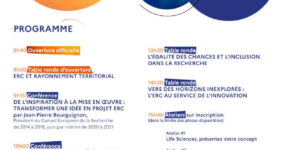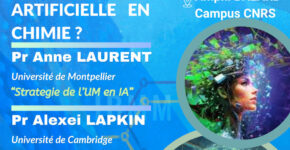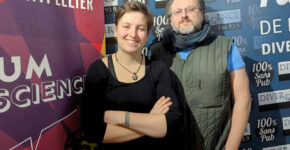
Artificial intelligence: theoretical principles, learning methods, and applications
Content type: Calendar

Science at UM [S04-ep21]: Papillomas in the stomach
Content type: Podcast
Published on: March 21 , 2025
This week on A l’UM la science, Nicolas Tessandier, a researcher at the Mivegec laboratory, tells us...

Meetings dedicated to European research in Montpellier
Content type: Press release
Published on: March 19 , 2025
Monday, March 31, 2025, will be a day dedicated to the ERC schemes of the framework program of...

Balard Chemistry Analysis and Characterization Platform (PAC Chimie Balard)
Content type: Page
The UAR PAC Chimie Balard Montpellier offers a unique set of equipment for the analysis and physicochemical characterization of materials and biomolecules (analysis of solutions, solids, surfaces, determination of structural, textural, and thermodynamic properties). The PAC Montpellier aims to address multidisciplinary analytical issues, mainly in the fields of chemistry and at the interfaces between biology and health, agronomy and ecology, and materials and the environment. The Analysis and Characterization Platform offers exceptional measurement capabilities in X-ray diffraction, electron microscopy, NMR spectroscopy, IR-Raman spectroscopy, Mössbauer spectrometry, SQUID magnetometry, RPE spectroscopy, XPS, mass spectrometry, textural and granulometric analysis, chemical analysis (elemental analysis, AAS, ICP-MS, X-ray fluorescence), calorimetric and thermal analysis, and dielectric spectroscopy. The various services are organized around centers of expertise based on technical staff dedicated to these devices, in constant contact with researchers and Professors in the field. The Analysis and Characterization Platform of the Balard Chemistry Cluster is open to the entire academic scientific community and the industrial world (large groups, SMEs, startups). Access to services is provided in the form of services, collaborations, or partnerships, including: analytical services provided by PAC staff, research and development projects, methodological and instrumental developments, theoretical and practical training. Label: Support and Research Unit Research UAR) Main supervisory bodies: UM - CNRS - ENSCMP Research cluster: Chemistry cluster

Host-Vector-Parasite-Environment Interactions in Neglected Tropical Diseases caused by Trypanosomatids (INTERTRYP)
Content type: Page
The InterTryp joint research unit is developing a "One Health" approach in the global context of eliminating these neglected tropical diseases. It conducts research at different levels (gene, molecule, individual, territory, country, region) to better understand the pathogen system and assess the risks. It studies the longer-term mechanisms of co-evolution between parasites, vectors, symbionts, and mammalian hosts (animals and humans) linked to these changes. It proposes prevention and control methods adapted to the constraints of developing countries: surveillance tools adapted to the context, new therapeutic molecules, vector control, and vaccine research. In particular, it is behind the first vaccine against canine leishmaniasis. Label: Joint Research Unit Research UMR) Main supervisory bodies: CIRAD - IRD Secondary supervisory body: UMP Research cluster: Biology-Health Cluster (BS) Doctoral schools: CBS2: Chemical and Biological Sciences for Health - GAIA: Biodiversity, Agriculture, Food, Environment, Earth, Water Website

Montpellier Ecology, Evolution, Biodiversity (MEEB)
Content type: Page
Label: Support and Research Unit Research UAR) Main supervisory bodies: CNRS - UMP Research cluster: Agriculture-Environment-Biodiversity Cluster (AEB)

Water Management, Stakeholders, Users (G-EAU)
Content type: Page
The Water Management, Actors, Uses joint research unit brings together 90 permanent researchers and engineers and around 50 doctoral and postdoctoral students from all disciplines working together on issues of integrated and adaptive water management. It conducts research on the trajectories of socio-hydrosystems and their regulation; it contributes to the design and evaluation of tools facilitating the implementation of innovative public policies concerning water; it participates in multidisciplinary training of students in the field of water. The UMR G-EAU, attached to the I-Site MUSE, is a member of ICIREWARD, a Category 2 Center under the auspices of UNESCO on water in Montpellier. The core of the UMR G-EAU project is to understand how socio-hydrosystems function both in normal circumstances and in times of crisis or high tension (scarcity, flooding, pollution). We analyze the hydrological, technical, social, economic, and political processes within a water-related territory and their consequences. We also mobilize our interdisciplinary strength to analyze the combined effects of these processes and ultimately identify opportunities for governance and adaptation in complex and uncertain environments. The project includes the design and testing, in interaction with society, of tools and devices aimed at revealing how these systems work and intervening in their trajectory. Originating from teams working on irrigated systems, the UMR G-EAU has gradually broadened its focus to include integrated management. It now approaches water-related territories as complex systems, drawing on a variety of perspectives: Plurality of uses and interests: irrigation, drinking water, recreation, energy, purification, flood protection Plurality of water types: surface water, groundwater, wastewater Plurality of processes: water and pollutant transfers, irrigation technologies, economic instruments, public participation, modes of appropriation Plurality of modes of regulation: river and canal infrastructure, water access and land use policies, water use standards. Plurality of disciplines For all of its research, the UMR G-EAU emphasizes approaches rooted in case studies. This means investing in research based on field observation, supplemented by experimental approaches conducted in interaction with users and/or managers. To build on the knowledge thus generated, the UMR relies on a large network of partners and research sites around the world, in France and in countries of the South, presenting a diversity of water-related issues and hydro-ecological, socio-economic, and political contexts. One-third of our staff are expatriates in North Africa, West and Southern Africa, and Southeast Asia. In France, collaboration agreements bring us closer to institutions in charge of watershed management. This involvement in the field leads to strong interactions with stakeholders. Finally, the UMR G-EAU is committed to transferring its results. Three avenues are used to achieve this: Testing the proposed techniques and instruments with local institutions; Training students in the North within the Montpellier Water Master's program and engineering schools supervised by the UMR (Montpellier SupAgro and AgroParisTech) and in the South within Master's programs run by our host partners; Welcoming partner companies, particularly young start-ups. Label: Joint Research Unit Research UMR) Main supervisory bodies: CIRAD - IRD - INRAE - AgroParis Tech - Institut Agro - BRGM Secondary supervisory body: UMP Research cluster: Agriculture-Environment-Biodiversity (AEB) Doctoral schools: EDEG: Economics and Management - GAIA: Biodiversity, Agriculture, Food, Environment, Earth, Water Website

Montpellier University Space Center (CSUM)
Content type: Page
The Montpellier University Space Center (CSUM) is the French leader in the development and launch of academic nanosatellites. The CSUM is a Support and Research Unit Research University of Montpellier (UAR UM 502) providing support for training and research through nanosatellite engineering. Label: Support and Research Unit Research UAR) Main supervisory bodies: UMP Research center: Mathematics, Computer Science, Physics, and Systems (MIPS) Website

What is Artificial Intelligence used for in chemistry?
Content type: Calendar

The Great African Rift, at the confluence of time
Content type: Calendar

Science at UM [S04-ep20]: Riding the waves
Content type: Podcast
Published on: March 14 , 2025
This week on A l’UM la science, Frédéric Bouchette and Garance Marlier, researchers at...

When VAT for micro-entrepreneurs reignites the debate on their status
Content type: The conversation
Published on: March 13 , 2025
Launched in 2008, the status of auto-entrepreneur (or micro-entrepreneur) has been met with great...

Data warehouses: understanding them and choosing the right one
Content type: Calendar

The challenges of data reproducibility
Content type: Calendar

Broadcasting licenses
Content type: Calendar

Open Researcher and Contributor Identifier (ORCID)
Content type: Calendar